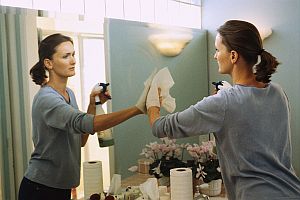








 Spring is just around the corner, and it’s a perfect time to open up the windows in your house, let in some fresh air and give the whole place a good scrub. But you should also be aware of some of the possible health hazards involved in getting your place spic and span. You don’t want to be breathing harmful chemicals, and it’s a good idea to remove any health hazards that may be lurking in seemingly innocent areas of your house. Instead of using chemical-laden cleaning products, try to use simple non-toxic cleaners include vinegar, baking soda and water in varying combinations. They are just as effective for many jobs and will not expose you to harmful fumes. Read on for some healthy spring cleaning tips!
Spring is just around the corner, and it’s a perfect time to open up the windows in your house, let in some fresh air and give the whole place a good scrub. But you should also be aware of some of the possible health hazards involved in getting your place spic and span. You don’t want to be breathing harmful chemicals, and it’s a good idea to remove any health hazards that may be lurking in seemingly innocent areas of your house. Instead of using chemical-laden cleaning products, try to use simple non-toxic cleaners include vinegar, baking soda and water in varying combinations. They are just as effective for many jobs and will not expose you to harmful fumes. Read on for some healthy spring cleaning tips!
For sparkling windows
Far better than commercial glass cleaner, this window washing solution is non-toxic and leaves no streaks: Combine ¼ cup of vinegar, 2 cups of water and ½ teaspoon of liquid dish detergent in a spray bottle, and voila! You’ve got window cleaning solution that will cut through the waxy buildup of years’ worth of cleaning products, leaving your windows crystal clear. More tips:
To clean a toilet
Pour about ¼ cup of white vinegar into the toilet bowl and put some vinegar in a spray bottle to spray the sides of the bowl. Add a sprinkling of baking soda, let it sit for 5 minutes, then scrub with a toilet brush as usual. To remove hard water marks from the bowl, add two cups of vinegar to the water in the bowl and leave it overnight to dissolve the marks.
Remove the dust
Dust is heaven for dust mites, which can trigger allergies and make life generally uncomfortable. Old wool sweaters or fabric make good dust cloths, as they will pick up dust easier than other cleaning cloths. At the same time, replace air conditioning and heating filters so they do not serve to redistribute the dust and other airborne allergens around your newly clean house.
Get rid of mold and mildew
Provoking allergic reactions and worsening asthma, mold and mildew are constant enemies in areas of your home that remain warm and damp for extended periods of time. The most effective non-toxic mold remover is tea tree oil. Mix two teaspoons of tea tree oil with two cups of water and use it in a spray bottle on any mold or mildew. The scent will dissipate in a few days, but if it is too strong for your taste, straight vinegar works almost as well, killing 84 percent of mold spores. You can add a few drops of your essential oil of choice if you do not wish your bathroom to smell like a salad for a few hours.
To clean sinks, counters and bathroom tile
A mixture of one part baking soda, two parts vinegar and four parts water makes a good scouring cream for these surfaces. One of the most germ-laden locations is your kitchen sink, so give this an extra scrub with straight vinegar every so often to kill pathogens.
To clean and polish wood surfaces
Use a solution made of equal parts lemon juice and olive oil. Rub in and let it dry.
 While many look forward to Spring and its abundance of flowers, for allergy sufferers it’s more likely to be a season of stuffy noses, sneezing and watery, itchy, irritated eyes. For some, these symptoms may escalate to include sore throats and headaches. If you experience several of these symptoms and they persist for more than a couple of weeks, you may be suffering from seasonal allergies. If this is the case, fortunately there are things you can do about it.
While many look forward to Spring and its abundance of flowers, for allergy sufferers it’s more likely to be a season of stuffy noses, sneezing and watery, itchy, irritated eyes. For some, these symptoms may escalate to include sore throats and headaches. If you experience several of these symptoms and they persist for more than a couple of weeks, you may be suffering from seasonal allergies. If this is the case, fortunately there are things you can do about it.
Find out what you’re allergic to. A visit to a certified allergist can help to pinpoint which plants and pollen you’re most sensitive to. The doctor may be able to prescribe a seasonal treatment plan that you can start before symptoms begin to appear.
Avoid the outdoors. Spend as much time as feasible during “allergy season” indoors, especially in the mornings and on warm, dry, windy days, when pollen counts are the highest. If you normally run or exercise in the park, consider joining a gym for the Spring and doing your running on a treadmill.
Wear a hat when outdoors, and wash your hair often. Your hair is like a magnet to pollen, so try washing your hair before you go to bed so as not to transfer it to your pillow when you sleep. If you normally use hair gels or sprays, avoid them during allergy season, because they become “pollen magnets.”
Wash your linen and clothes more often. And when you do, don’t hang them on a line outdoors to dry. This just allows the newly-clean clothes to pick up pollen in the air.
Don’t use window fans. Instead, use an air conditioner set on “Recirculate” to keep out the pollen rather than a fan, which will just take the pollen in the air and spread it around.
Use a saltwater nasal spray. You can make this yourself by mixing a teaspoon of table salt with eight ounces of water. Using this spray twice a day can help to wash allergens out of your nasal passages, and to keep them moisturized.
Eat allergy-fighting foods. Foods that are rich in Vitamin C have been shown to unblock clogged sinuses, so indulge in oranges, broccoli, grapefruit, kale and brussels sprouts. The flavonoid quercetin has been shown to inhibit the release of histamines that trigger the symptoms of allergies, so adding foods high in quercetin like black and green tea, berries, apples, and red onions may help. Some studies have indicated that papaya and pineapple, which contain bromelain, can reduce seasonal allergy symptoms.
When you stop to sniff the flowers, sniff the right flowers. Plants that are allergy-friendly include periwinkles, gladiolus, irises, begonias, orchids, and bougainvilleas; plants that are likely to provoke your allergies include daisies, sunflowers, zinnias, dahlias, chrysanthemums, lily of the valley, gardenias, narcissus, and star jasmine.
Your dog is a source of allergens, too. When Rover comes in after frolicking in the yard, consider washing his feet off rather than allowing him to bring mold and pollen from outside into the house with him. Pet dander can also trigger allergies, so bathe your pets often and wash their bedding when you wash your own.
Leave your shoes by the door. Pollen and other allergens catch a ride on your feet, just as they do on Rover’s.
Avoid strong fragrances. Once the allergic reactions have begun, your immune system may become as sensitive to your favorite perfume as it is to pollen.
Wear movie star sunglasses. Really. Large, outsized glasses can help to keep pollen from being blown into your eyes when you’re outdoors.
Consider ditching your carpets. For allergy sufferers, your carpets may be the worst choice possible in floor coverings, because they tend to trap allergens of all kinds. If you love your carpets, vacuum them often, preferably with a machine that has HEPA filters.